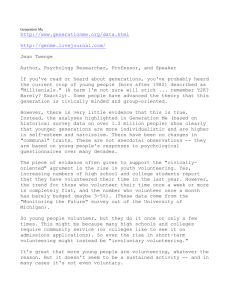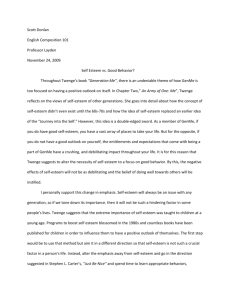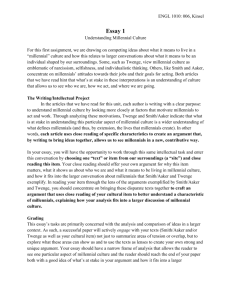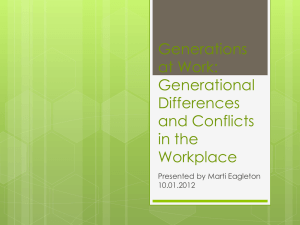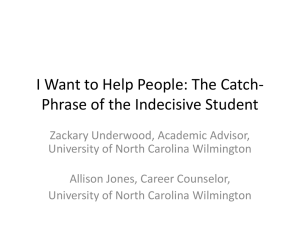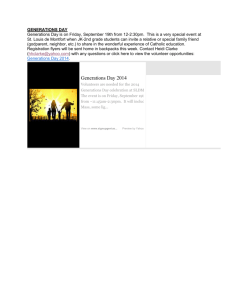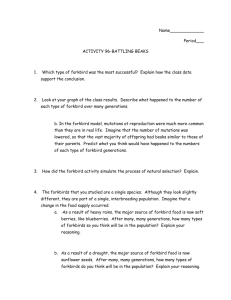Generation Me: How Are We Different?
advertisement
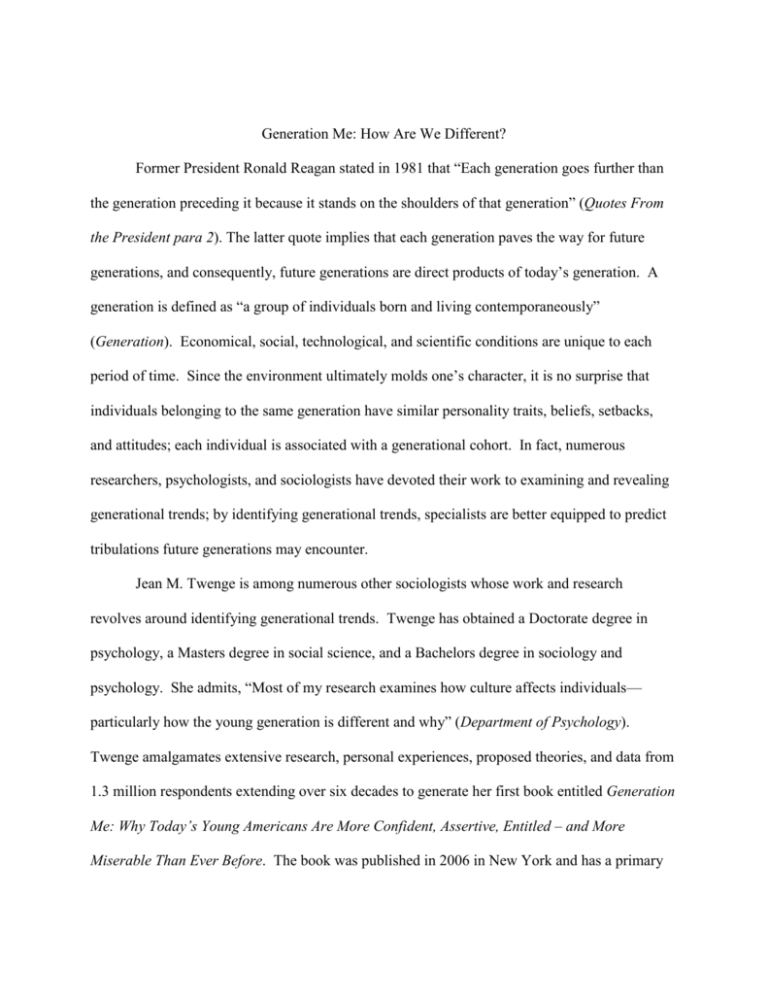
Generation Me: How Are We Different? Former President Ronald Reagan stated in 1981 that “Each generation goes further than the generation preceding it because it stands on the shoulders of that generation” (Quotes From the President para 2). The latter quote implies that each generation paves the way for future generations, and consequently, future generations are direct products of today’s generation. A generation is defined as “a group of individuals born and living contemporaneously” (Generation). Economical, social, technological, and scientific conditions are unique to each period of time. Since the environment ultimately molds one’s character, it is no surprise that individuals belonging to the same generation have similar personality traits, beliefs, setbacks, and attitudes; each individual is associated with a generational cohort. In fact, numerous researchers, psychologists, and sociologists have devoted their work to examining and revealing generational trends; by identifying generational trends, specialists are better equipped to predict tribulations future generations may encounter. Jean M. Twenge is among numerous other sociologists whose work and research revolves around identifying generational trends. Twenge has obtained a Doctorate degree in psychology, a Masters degree in social science, and a Bachelors degree in sociology and psychology. She admits, “Most of my research examines how culture affects individuals— particularly how the young generation is different and why” (Department of Psychology). Twenge amalgamates extensive research, personal experiences, proposed theories, and data from 1.3 million respondents extending over six decades to generate her first book entitled Generation Me: Why Today’s Young Americans Are More Confident, Assertive, Entitled – and More Miserable Than Ever Before. The book was published in 2006 in New York and has a primary objective of enlightening readers about the differences between those born in 1970 to 2000 (designated “Generation Me”) and the previous generations. In the book, Twenge acknowledges the commonly accepted conceptions and misconceptions of Generation Me, and rationalizes this generation’s attitude to society’s effect on the individual. Twenge successfully executes the latter by organizing Generation Me: Why Today’s Young Americans Are More Confident, Assertive, Entitled – and More Miserable Than Ever Before in a noteworthy manner. The first three chapters of the book bring to light the overbearing importance placed on the individual in this generation; it focuses on the cultural and demographic influences that have sculpted this self-important mindset. The following four chapters expand on the consequences of Generation Me’s narcissistic outlook, focusing on the type of relationships they form with each other and other generations. The final chapter of the book entitled “Applying Our Knowledge: The Future of Business and the Future of the Young” incorporates the foregoing conversations about Generation Me and formulates a prediction on future generations. It also proposes solutions for the issues members of Generation Me encounter, and different tactics that institutions and older generations can utilize to get along with the emerging members of this generation. The final chapter vividly portrays Twenge’s strategy to appeal to a broad range of readers, and consequently, Generation Me: Why Today’s Young Americans Are More Confident, Assertive, Entitled – and More Miserable Than Ever Before has an all-encompassing target audience. Twenge effectively articulates a potent explanation for today’s generation by appealing to pathos and ethos, while captivating a broad target audience in Generation Me: Why Today’s Young Americans Are More Confident, Assertive, Entitled – and More Miserable Than Ever Before. Twenge’s Generation Me: Why Today’s Young Americans Are More Confident, Assertive, Entitled – and More Miserable Than Ever Before enthralls readers by appealing to emotions, or using pathos. Twenge effectively executes this rhetorical technique by continuously using real life examples to support her claims. This is exemplified in the early chapters where Twenge establishes that members of Generation Me place a profuse amount of importance on the individual. She reinforces the latter assertion by making reference to modern examples that illustrate this attitude. For instance, when Twenge attempts to correlate the increase in tattoos and body piercings to the self-centered viewpoint of today’s generation, she retells the story of twenty-year old Jay. Jay’s grandmother was very upset and disappointed when she first discovered Jay’s tattoos. However, Jay explains, “My tattoos are an expression of who I am and how I view myself. My tattoos show the different sides of who I am” (Twenge 96). Jay’s response is a familiar notion to Generation Me and the coexisting generational cohorts; self-expression is expected of a self-important generation. Consequently, readers are able to identify with Jay’s comment, and thus, construe their own conclusion that parallels Twenge’s argument. Moreover, Twenge regularly refers to the experiences that members of the older generations have had with Generation Me; she continuously quotes employers, parents, and professors who have encountered the intensity of the self-important movement firsthand. In doing so, Twenge forms an argument that emotionally engages members of Generation Me and older generations alike; the younger generation is set up to feel misunderstood by the older generation and thus, it elicits a yearning for change, while the older generation is overcome with a sense of empowerment that they are not alone in their interpretation of the younger generations’ attitude. Twenge’s strategy proficiently appeals to readers’ emotions because it is relevant and relatable to a broad audience. Twenge persists in appealing to readers’ emotions by making reference to eminent present day concepts to further justify her claim that Generation Me overstresses the importance of the individual. These concepts include, but are not limited to “You must love yourself before you can love others” (90), “You can be anything you want to be” (72), “Just be yourself” (50), and “Be honest with yourself” (50). By integrating common phrases, readers are able to better relate to the claims being made. As a result, readers become emotionally invested and begin to analyze their personal experiences and how it coincides with Twenge’s argument. Twenge’s strategy to appeal to readers’ emotions by using real life examples is vital in developing her argument. Furthermore, Twenge artfully appeals to emotions and intensifies her argument by addressing problems that accompany the self-esteem/self-expression movement. Among numerous other issues, Twenge explains the crippling anxiety and overwhelming depression that hinders numerous Generation Me members as they mature. She insists, “Generation Me has been taught to expect more out of life at the very time when good jobs and nice houses are increasingly difficult to obtain” (109). Twenge then elaborates on the increasing difficulty of obtaining a concrete job in today’s competitive society, and thus, the hardships that Generation Me members face financially. By exposing these valid concerns, Twenge is promoting fear in members of Generation Me in hopes of motivating positive changes that will prevent this disorder from prevailing. Simultaneously, these concerns encourage empathy in older generations. Twenge also addresses concerns that older generations have with the new generation. For example, Twenge refers to the problems that employers from older generations have with the incoming employee force; on average, the younger work force feels a higher sense of entitlement in their careers (144). By addressing these issues, Twenge reverses the emotions, and now members of Generation Me feel empathy for the older generation, while the desire for change is promoted in the older generation. Twenge’s strategic use of concern stresses the importance of understanding the outlook and attitudes of Generation Me for all members of society. Twenge utilizes compelling examples and concerns to strengthen her argument by appealing to readers’ emotions and ability to relate. Twenge’s credibility, or ethos, is established in the early chapters of Generation Me: Why Today’s Young Americans Are More Confident, Assertive, Entitled – and More Miserable Than Ever Before. Twenge ensures that readers are aware that in a span of thirteen years, she has collected and thoroughly analyzed numerous studies on generational differences. She has also examined an abundant amount of psychological data, including personality and attitude tests that were administered throughout different decades. In addition, she has gathered a large amount of supplemental data from various sources including a survey of over three-hundred thousand American college freshmen nationwide since the late 1960s by the Higher Education Research Institute, qualitative opinions from over two hundred of her students at San Diego State University, personal stories, popular culture, and many other sources. (9) Although Twenge validates her credibility in the introduction of Generation Me: Why Today’s Young Americans Are More Confident, Assertive, Entitled – and More Miserable Than Ever Before, she prevents it from dwindling throughout the book. She does this by relentlessly using statistics and her research to support her claims. In fact, there is an evident pattern in the structure of each section of the book. Each section commences with an introduction of the claim that Twenge is making followed by statistical data to support her findings. Twenge then incorporates qualitative data such as personal anecdotes, examples from the media or published books, and others’ perceptions to corroborate her claim. The impact of organizing the text in such a manner is substantial; this technique leaves little room for opposition and ultimately prevents readers from diverging from Twenge’s main arguments. The usage of both statistics and qualitative sources serves the purpose of expanding the target audience; by including both forms of evidence for each claim, Twenge is able to plea her case using both quantitative and qualitative reasoning, which in turn maximizes the amount of people convinced by her claims. In conjugation with the reasons previously proposed to explain Twenge’s basis for establishing credibility, Twenge’s classification as the earliest member of Generation Me aids in deeming her speculations as plausible. Since Twenge was born in 1971, she has witnessed the gradual shift in attitude and the increasing focus on the individual firsthand. In addition, given that she has entered adulthood as part of Generation Me, she has been subjected to the issues and tribulations that Generation Me members must overcome. Accordingly, this experience deems her more suitable to assess the differences between Generation Me and other generations, determine the dominant personality and attitude traits for members of Generation Me, explain why and how these differences and traits are acquired, and warn Generation Me of future issues they may encounter as they mature. By establishing her credibility and employing her research to rationalize the claims in Generation Me: Why Today’s Young Americans Are More Confident, Assertive, Entitled – and More Miserable Than Ever Before, Twenge effectively produces an eloquent rhetorical argument. Generation Me: Why Today’s Young Americans Are More Confident, Assertive, Entitled – and More Miserable Than Ever Before is a successfully maneuvered rhetorical device due to Twenge’s use of pathos and ethos, and her ability to entice a broad target audience. Twenge successfully executes this analysis of Generation Me because she does not tackle the negative aspects of this generation in a demeaning manner nor does she attempt to stereotype the generation. She bluntly states in the introduction that the book’s chief objective is to “undertand, not change [this generation]…. Young people today should be seen as products of their culture— a culture that teaches them the primacy of the individual at virtually every step, and a culture that was firmly in place before they were born” (8). Conversely, Twenge still takes into account and addresses what has been said about Generation Me, as well as the impressions that older generations have about this generation. By acknowledging different perspectives on Generation me, utilizing statistics and research to support her personal claims, and using real life examples that readers from all age groups can relate to, Twenge situates readers to generate a conclusion and explanation that mimics her argument. Thus, Generation Me: Why Today’s Young Americans Are More Confident, Assertive, Entitled – and More Miserable Than Ever Before is a compelling and cleverly fabricated rhetorical device. Works Cited "Generation - Definition and More from the Free Merriam-Webster Dictionary." Merriam- Webster Online. N.p., n.d. Web. 15 Oct. 2010. <http://www.merriamwebster.com/dictionary/generation>. "Quotes from the presidents." Pocantico Hills Central School. N.p., n.d. Web. 15 Oct. 2010. <http://www.pocanticohills.org/presidents/quotes.htm>. Twenge , Jean M.. "Jean M. Twenge." Department of Psychology. N.p., n.d. Web. 15 Oct. 2010. <www.psychology.sdsu.edu/new-web/facultystaff/twenge.html>. Twenge , Jean M.. Generation Me: Why Today's Young Americans Are More Confident, Assertive, Entitled--and More Miserable Than Ever Before. 1993. Reprint. New York City: Free Press, 2006. Print.
